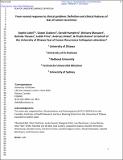Files in this item
From normal response to clinical problem : definition and clinical features of fear of cancer recurrence
Item metadata
| dc.contributor.author | Lebel, Sophie | |
| dc.contributor.author | Ozakinci, Gozde | |
| dc.contributor.author | Humphris, Gerald | |
| dc.contributor.author | Mutsaers, Brittany | |
| dc.contributor.author | Thewes, Belinda | |
| dc.contributor.author | Prins, Judith | |
| dc.contributor.author | Dinkel, Andreas | |
| dc.contributor.author | Butow, Phyllis | |
| dc.contributor.author | Univ Ottawa | |
| dc.date.accessioned | 2017-05-12T23:33:40Z | |
| dc.date.available | 2017-05-12T23:33:40Z | |
| dc.date.issued | 2016-08 | |
| dc.identifier | 242360083 | |
| dc.identifier | 6ada63fb-68d9-4c10-89c1-1bdbb76b932d | |
| dc.identifier | 000378884400002 | |
| dc.identifier | 84966713483 | |
| dc.identifier | 000378884400002 | |
| dc.identifier.citation | Lebel , S , Ozakinci , G , Humphris , G , Mutsaers , B , Thewes , B , Prins , J , Dinkel , A , Butow , P & Univ Ottawa 2016 , ' From normal response to clinical problem : definition and clinical features of fear of cancer recurrence ' , Supportive Care in Cancer , vol. 24 , no. 8 , pp. 3265-3268 . https://doi.org/10.1007/s00520-016-3272-5 | en |
| dc.identifier.issn | 0941-4355 | |
| dc.identifier.other | ORCID: /0000-0001-5869-3274/work/27163462 | |
| dc.identifier.other | ORCID: /0000-0002-4601-8834/work/64033849 | |
| dc.identifier.uri | https://hdl.handle.net/10023/10767 | |
| dc.description.abstract | Research to date on fear of cancer recurrence (FCR) shows that moderate to high FCR affects 22-87 % of cancer survivors and is associated with higher psychological morbidity (Simard et al J Cancer Surviv 7:300-322, 2013). Despite growing research interest in FCR, the lack of consensus on its definition and characteristics when it reaches a clinical level has impeded knowledge transfer into patient services. In order to address these gaps, expert researchers, policy makers, trainees, and patient advocates attended a 2-day colloquium at the University of Ottawa in August 2015. A Delphi method was used to identify the most relevant definition of FCR, and the attendees generated possible diagnostic characteristics of clinical FCR. After three rounds of discussion and voting, the attendees reached consensus on a new definition of FCR: "Fear, worry, or concern relating to the possibility that cancer will come back or progress." Regarding clinical FCR, five possible characteristics were proposed: (1) high levels of preoccupation, worry, rumination, or intrusive thoughts; (2) maladaptive coping; (3) functional impairments; (4) excessive distress; and (5) difficulties making plans for the future. The new proposed definition of FCR reflects the broad spectrum in which patients experience FCR. A consensual definition of FCR and the identification of the essential characteristics of clinical FCR are necessary to accurately and consistently measure FCR severity and to develop effective interventions to treat FCR. We hope this broad definition can encourage further research and the development of inclusive policies for all cancer patients and survivors who are struggling with this issue. | |
| dc.format.extent | 4 | |
| dc.format.extent | 575819 | |
| dc.language.iso | eng | |
| dc.relation.ispartof | Supportive Care in Cancer | en |
| dc.subject | Fear of cancer recurrence | en |
| dc.subject | Clinical fear of cancer recurrence | en |
| dc.subject | Delphi study | en |
| dc.subject | Expert opinion | en |
| dc.subject | Definition | en |
| dc.subject | Psychosocial oncology | en |
| dc.subject | RC0254 Neoplasms. Tumors. Oncology (including Cancer) | en |
| dc.subject | BF Psychology | en |
| dc.subject | SDG 3 - Good Health and Well-being | en |
| dc.subject.lcc | RC0254 | en |
| dc.subject.lcc | BF | en |
| dc.title | From normal response to clinical problem : definition and clinical features of fear of cancer recurrence | en |
| dc.type | Journal item | en |
| dc.contributor.institution | University of St Andrews. St Andrews Sustainability Institute | en |
| dc.contributor.institution | University of St Andrews. School of Medicine | en |
| dc.contributor.institution | University of St Andrews. Health Psychology | en |
| dc.contributor.institution | University of St Andrews. WHO Collaborating Centre for International Child & Adolescent Health Policy | en |
| dc.identifier.doi | 10.1007/s00520-016-3272-5 | |
| dc.description.status | Peer reviewed | en |
| dc.date.embargoedUntil | 2017-05-12 |
This item appears in the following Collection(s)
Items in the St Andrews Research Repository are protected by copyright, with all rights reserved, unless otherwise indicated.

